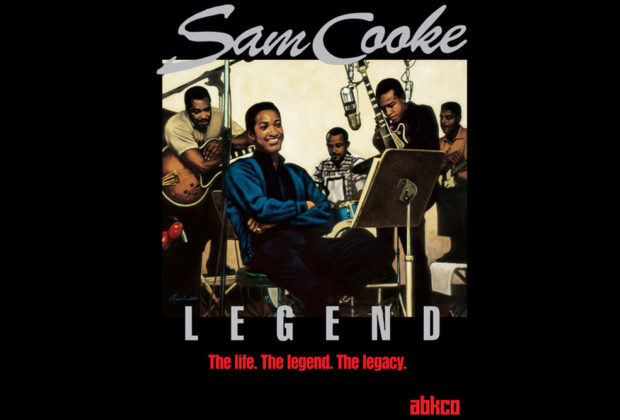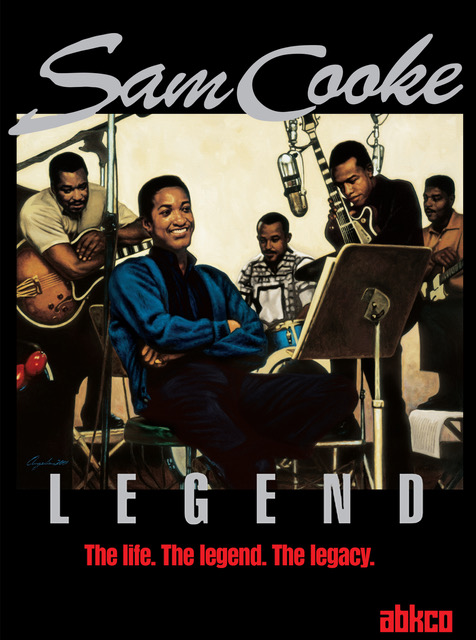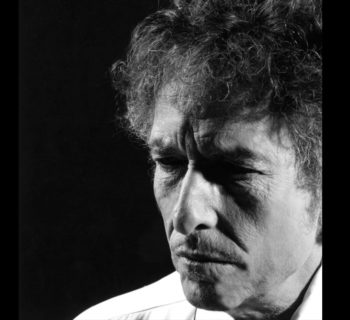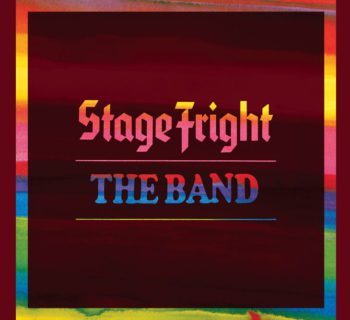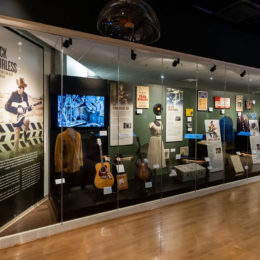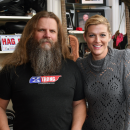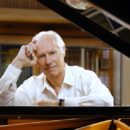The life and music of Sam Cooke, soul’s first superstar, are examined in the critically lauded Sam Cooke: Legend, the Grammy award-winning feature documentary from ABKCO Films.
The 66-minute film examines the extraordinary career and tells the real story of his life through first-person accounts from family, childhood friends, musical collaborators and business associates along with Sam Cooke himself. Originally released in 2003, it has long been out of print; it will be reissued on DVD April 30.
With the success of the film One Night In Miami..., directed by Regina King, focus on the life of Cooke, portrayed in the film by Leslie Odom Jr., has grown exponentially. Sam Cooke: Legend traces both Cooke’s professional and personal life – from his gospel-singing roots in the early 1950’s through his R&B and pop music career to his untimely death in 1964. It was available for streaming through Amazon Prime earlier this year in celebration of the soul icon’s 90th birthday. The forthcoming DVD re-release includes extra content providing additional insight into the life and legacy of Sam Cooke.
The film recounts his commitment to the struggle for civil rights, underscored by his last and most enduring hit song, “A Change Is Gonna Come,” as well as his transcendent and consummate popular appeal.
Sam Cooke: Legend was awarded a Grammy in 2004 in the Best Long Form Video (since renamed Best Music Film) category. One of the highlights includes archival newsreel footage of Cassius Clay, the jubilant newly-crowned heavy weight champion, spotting Sam Cooke in the crowd and inviting him into the ring exclaiming, “Let that man up! This is Sam Cooke! This is the world’s greatest rock ‘n’ roll singer!” That same frantic and scenario is depicted, almost scene for scene, in One Night In Miami…
Sam Cooke: Legend was written by best-selling author Peter Guralnick whose Dream Boogie: The Triumph of Sam Cooke, is widely recognized as the definitive biography of the musical giant. It is narrated by Tony Award-winning actor Jeffrey Wright (Basquiat, Angels In America, Ali) and was directed by Mary Wharton and produced by Robin Klein and Mick Gochanour.
The documentary features rare and never-before-seen performance clips, TV footage and family photos, plus exclusive original interviews. These include conversations with the late Aretha Franklin, TV host Dick Clark, singer Lou Rawls who was a childhood friend of Cooke’s and R&B great Lloyd Price.
Also seen is Bobby Womack who, early in his career, enjoyed a rewarding musical association with Cooke who produced his hit “It’s All Over Now,” later covered by The Rolling Stones as referenced in One Night In Miami…
Cooke’s gospel roots are discussed by LeRoy Crume of the Soul Stirrers, the seminal group that Cooke joined as a teen, Cooke’s siblings as well as daughter Zeriiya (Linda Cooke Womack). Another participant is recording mogul Lou Adler (Mamas and Papas, Carole King), who co-wrote “Wonderful World” with Cooke and Herb Alpert.
The DVD re-release includes a 3,000-word biography of Cooke and a comprehensive discography of his recordings, highlighting ABKCO's Sam Cooke Remastered Series. Beyond that the DVD’s extra content, running in excess of 4 ½ hours and not seen in the streaming version, is highlighted by additional interview footage with numerous of Cooke’s contemporaries including the aforementioned Aretha Franklin, Lou Rawls, Lloyd Price, Lou Adler, Bobby Womack and music producer Luigi Creatore. Family members seen in the extra footage include Linda Cooke-Womack (Zeriiya), L. C. Cooke, Charles Cook and Agnes Cook-Hoskins plus “Burn Baby Burn” radio personality Magnificent Montague.
The film chronicles Cooke’s struggle to make it in the world of popular mainstream music culminating in his triumphant engagement at New York’s Copacabana in the summer of 1964. From his birth in the Mississippi Delta through his family’s move to Chicago and the realization of his gift as expressed in his early gospel work, continuing through his change to secular music, his life can be viewed as a microcosm of the struggle for recognition and opportunity by African Americans in the mid-20th century.
Born in Clarksdale, Mississippi and raised on Chicago’s South Side, Sam Cooke was the son of a Baptist minister. He started singing in the church choir as a child and encouraged by his father, joined with his siblings to form a gospel group, the Singing Children. By the time he was a teenager, he had achieved significant success within the gospel community on the strength of his distinctive vocal style. In 1950 he was asked to replace legendary singer R.H. Harris as lead vocalist of The Soul Stirrers.
Cooke crossed over into the world of popular music in 1957 and shot to the top of the R&B and Pop charts with his self-penned “You Send Me.” From that time on, he was never out of the Top 40, with smash hits like “Wonderful World,” “Chain Gang,” “Cupid,” “Twistin’ the Night Away,” “Another Saturday Night” and “Shake.”
Cooke’s success didn’t surprise Aretha Franklin, who had earlier seen him perform at her father’s church. She commented, “Sam was a prince of a man. He just had everything going for him. Sam had the looks, he had the voice, he had the manner, he had the charm, he had the savoir faire.”
A triumphant early-‘60s tour of the UK left a generation of young musicians like the Beatles, the Rolling Stones, Van Morrison and Rod Stewart enthralled as well.
A champion of creative rights who wrote much of his own material, Cooke was among the first artists to recognize the importance of owning the publishing rights to his own compositions. He later established his own record label and business empire to better realize his far-reaching musical ambitions.
Refusing to perform for segregated audiences in the South, Cooke utilized his stature as a performer to help break down the color lines separating blacks from whites, and in the process became, along with his friend Muhammad Ali, a symbol of the new Black American. Further inspired by Bob Dylan’s “Blowin’ in the Wind,” Cooke wrote “A Change Is Gonna Come,” a song that would become an anthem of the civil rights movement after Cooke’s senseless shooting death in December of 1964.
Sam Cooke: Legend is a comprehensive look at a figure who is, arguably, one of the most influential musical forces of the twentieth century and whose legacy resonates to the present day.
When Sam Cooke was gunned down at age 33 in downtown Los Angeles, on December 11, 1964 at the Hacienda Motel it was front page news all over Southern California and the US. His first funeral service was in Chicago at the A.R. Leak Funeral Home on December 18, 1964. The next day a second service was held at the Mount Sinai Baptist Church in Los Angeles. Cooke was then interred in Glendale, California at the Forest Lawn Memorial Park Cemetery and his grave is in the Garden of Honor on the grounds.
Over the last few decades I’ve asked several of Cooke’s close friends, musical associates, along with record producers and engineers who worked with him in the studio or encountered him in person to discuss his ongoing legacy.
“I met Herb Alpert just after he got out of the army,” songwriter and record producer Lou Adler told me in a 2008 interview for my book Canyon of Dreams: The Magic and the Music of Laurel Canyon.
“We started talking about what he did and what I did, and we started writing songs. We cut four demos we wrote that Herbie sang on. We started going around to companies on Sunset and Vine, because the three major labels were RCA, Columbia, and Capitol, you couldn’t get into those. They didn’t let us in. A&R men at the time were dealing with established songwriters. There was a music publisher, Sherman Music—before we met Bumps Blackwell—that published the four songs. We actually got covers off those demos. One was ‘Circle Rock’ for the Salmas Brothers on Keen Records, and Louie Prima’s band with Sam Butera recorded “Bim Bam.
“Bumps was then head of A&R at Keen Records, and Herb and I apprenticed under him at the label. I first met Sam Cooke at the Orpheum Theater in downtown Los Angeles, where LaVern Baker was performing. Sam said, ‘So, you’re the new kid in town…’
“Going back to my early days with Sam Cooke and Bumps Blackwell. The first thing that Bumps, Sam’s producer a man from Seattle who had worked with Quincy Jones when Quincy was 16 or 17, Bumps took us to school. He made us go through stacks of demos, made us break them down. ‘What was good about the first verse?’ ‘The second verse?’ ‘The bridge, and how do you come out of the bridge?’ So, from the beginning part of my career in the music business I was a song man. That was very important to me.”
“Bumps Blackwell hired Lou and Herb to listen to demos as apprentice A&R men and tell him what young people would want to buy,” recalled engineer and record producer Bones Howe to me in my book Turn Up The Radio Rock, Pop and Roll in Los Angeles 1956-1972.
“That was the beginning of that whole Sam Cooke thing. Herb Alpert and Lou Adler would arrive, sitting in the hallway at Radio Recorders. Herbie had his horn in a brown paper bag.”
Record label owner Bob Keane initially heard Sam Cooke singing in the Soul Stirrers in 1957. Cooke then earned a hit pop single, “You Send Me,” under the name Dale Cook on the Keen label. The nom de disque was an attempt to keep Sam’s voice and identity from the sanctified music community. No one was fooled. By the end of December ’57, the record had sold close to two million copies.
In 1960, Cooke moved to RCA Records, and Adler and Alpert wrote their first song for him, “All of My Life.” After that, they collaborated with Sam to compose “(What) a Wonderful World.”
“Herbie and I started writing ‘Wonderful World,’ and then I finished it with Sam at the Knickerbocker Hotel in Hollywood. Sam taught me how to communicate with musicians when you’re not a musician. He gave me a body language for working in the studio. I went out with him as kind of a road manager with the Soul Stirrers—that included Lou Rawls. Herbie and I produced Rawls’s first pop record.
“Sam also introduced me to a black world in Los Angeles, because I roomed with him for about eight months, including the Knickerbocker,” underscored Adler. “I learned more about the music and the people than I’d ever known, and I never experienced one bit of racial intolerance. People took me in because I was with Sam. We would go to the 5/4 Ballroom. Sam sang at my wedding [to Shelley Fabares in 1964].
“No one really looks at Sam as a singer-songwriter,” lamented Lou. “His songs were not always personal experiences, like ‘Twistin’ the Night Away.’
“First of all—Sam’s instrument. As a vocalist, he influenced Jackie Wilson and Otis Redding. He was the voice of that era, a tremendous vocalist. Also, he had a tremendous charisma that just spewed out of him in the recording studio, the stage, wherever he was.
“One time we went to the California Club to see Ed Townsend, who had a hit with ‘For Your Love,” recollected Adler. “He was up there singing that song, and, of course, getting a response. [He] tried to get Sam to come up onstage. We were just going for a night out. Finally, Sam came up and went into some gospel spiritual number. It was the first time that I saw the entire female audience get out of their seats and on top of their chairs. That was amazing. Charisma, I think, explains Sam in the right way. He had it walking into a recording studio, and he had it onstage. There was just something about him that was so beautiful.
“Sam Cooke is never talked about as a human being,” reiterated Adler in 2008. “He’s mentioned as the great soul singer that he was and the instrument that he had, and the fact that everybody from Otis Redding to Jackie Wilson emulated him, followed him. He was just a great human being. A great guy. A great buddy with a wonderful sense of humor.
“I lived with him for a while in Hollywood at the Knickerbocker Hotel. I lived with Sam also on Saint Andrews Place-George McCurn, Bumps Blackwell, and Lou Rawls hung out there. It was an apartment house. Later I went to Sam’s home in the Los Feliz area.”
“When Sam went to RCA, Radio Recorders was the de facto studio in Hollywood,” added Bones Howe. “I worked with Sam and ran the tape machines on one of his RCA albums. He was a sweetheart of a guy. He was a singer and a songwriter. He brought in a lot of his stuff. In the beginning, RCA was throwing stuff at him. Sam did so many of the things he wrote, and they started to be hits. At that point, you don’t mess with success.”
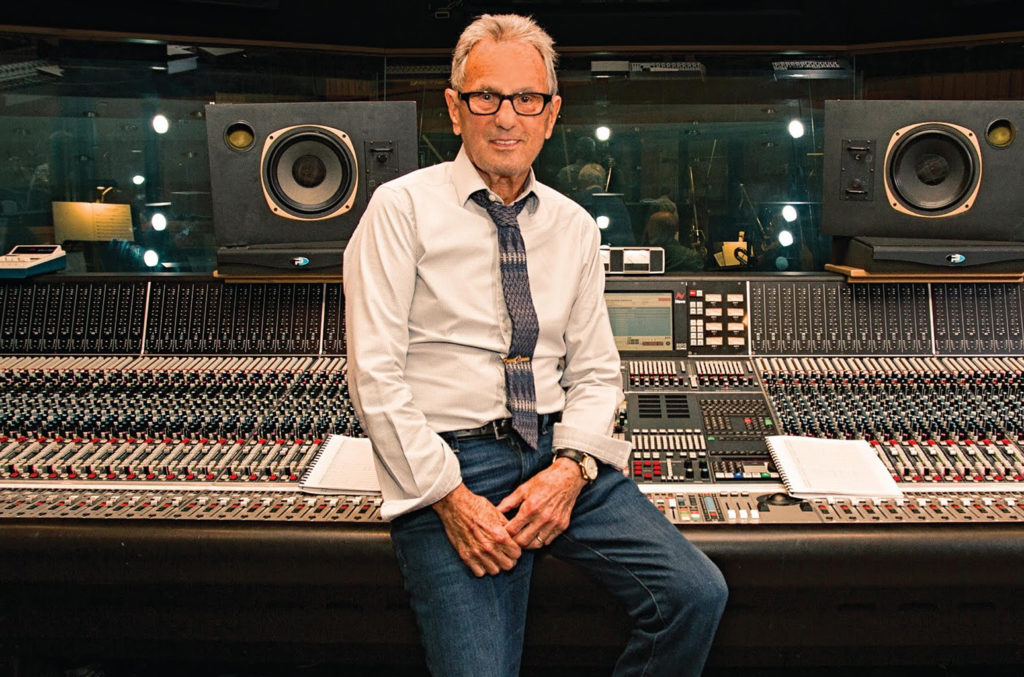
Al Schmitt
During 2006 I spoke with the legendary recording engineer and producer, Al Schmitt, about the RCA Recording Studios. He worked at the facility from 1959-1967.
“In the ‘50’s and ‘60’s lots of recording artists came to RCA: Shorty Rogers, Henry Mancini. Elmer Bernstein. Sam Cooke, Jesse Belvin, Gogi Grant and Ann Margaret. I left there in 1967. I broke Dave Hassinger in who later engineered the [1964-1966] albums by the Rolling Stones that Andrew Loog Oldham produced.
“Studio A and B were both the same size. They were big rooms, and then there was also studio C, a smaller room. You could mix in either room. The studios had very high ceilings and a nice parquet wood floor. Very nice. One of the things that made them so unique was that we had all those great live echo chambers. I think there were seven of them.
“With Sam Cooke and all the artists cutting at RCA there was very little overdubbing done then. The nice thing about doing everything at one same time was that you knew exactly what it was going to sound like. When you started layering things you were never sure. Then a lot of experimenting came in and it took longer and longer to make records and the expenses went up and up, ya know.
“RCA had a great, great microphone collection,” reflected Schmitt. “Just fabulous. Great Neumann and Telfunken microphones. Great RCA mikes. Plus they had the great, original Neve console. And they were just spectacular. They were so punchy. They was a punch and a warmth and still one of the finest consoles ever made. They were using a lot of Scotch tape then.
“I produced a bunch of things with Sam Cooke. I did all those early records: ‘Bring It On Home To Me,’ with Lou Rawls, ‘Cupid,’ ‘Another Saturday Night.’ I did a lot of work with J.W. Alexander who managed Sam. He was a sweet man. I did all the Jesse Belvin things. Some at RCA and some at Radio Recorders.”
“I met Sam Cooke a few times,” talent scout/record producer and songwriter Kim Fowley reminisced in an interview we conducted this century. “Walter E. Hurst was our lawyer, [and he] handled Sam, J. W. Alexander, Bobby Womack, Eddie Cochran, Sharon Sheeley, Jimmy O’Neill, Eden Ahbez, and Roger Corman. Bobby Womack kept his pit bull in one of Walter’s offices.
“In 1960 or ’61, Sam and I did separate panel discussions at UCLA in the first-ever music business class Walter taught on campus. Sam would cruise around on Friday nights in Hollywood, in a Ferrari with the top down so everyone could see him.
“After Sam moved over to RCA Records, I remember there was all this frustration that [arranger/ multi-instrumentalist] René Hall wasn’t as involved in the RCA records as he’d been previously in the Keen records. René’s wife, Sugar, worked for me and ran my office. Around the same time, my secretary was Lois Duncan, married to Cleve Duncan, the lead singer of the Penguins.
“Sam was probably hustled in the way they used to hustle you in the very early sixties, which was to say, ‘If you stay in LA, perceived by New Yorkers as a second-class music city, you’ll be a piece of shit forever.’ When I first went to New York City with Gary Paxton off our hit single of ‘Alley-Oop,’ we heard that same rap.”
Bobby Womack first came to prominence in the 1950s as part of the Womack Brothers, a gospel group that was comprised his siblings Cecil, Harry, Curtis and Friendly. Impressed with the group, Sam Cooke encouraged them to come to Los Angeles where he signed them to his SAR label.
They made the transition from gospel to R&B, when they recorded as the Valentinos, scoring with “Lookin’ For A Love” and “It’s All Over Now,” written by Bobby and his sister in law Shirley Womack. The song was covered by the Rolling Stones and produced by their manager Andrew Loog Oldham becoming their first #1 hit.
Womack’s career included stints as the guitarist in Ray Charles’ touring band, studio work in Los Angeles and Memphis and writing for other artists. He played sessions with Elvis Presley, Joe Tex, King Curtis, Aretha Franklin and Wilson Pickett, for whom he wrote two hits, “I’m A Midnight Mover” and “I’m In Love.” Womack is heard on Sly & the Family Stone, There’s a Riot Goin’ On. Yes, that’s Bobby’s wah-wah pedal on “Family Affair.”
Bobby wrote “Breezin’” for jazz great Gabor Szabo, which would be George Benson’s breakthrough recording a few years later. Womack penned tunes for Janis Joplin, “Trust Me,” the J. Geils Band, “Lookin’ for a Love,” Millie Jackson “Put Something Down On It,” and Ronnie Wood, “I Got A Feeling.”
As Bobby’s solo career evolved, he became the standard bearer for contemporary soul music, with such hits as “That’s The Way I Feel About ‘Cha” and “Woman’s Gotta Have It.”
In May of 2013, I Interviewed along with Womack, Damon Albarn of Blur and the Gorillaz, Chuck D. of Public Enemy, Barney Hoskyns, Bill Withers, Regina Womack, actor Antonio Fargas, and the Rolling Stones’ Ronnie Wood in the BBC-TV documentary movie Bobby Womack: Across 110th Street directed by James Maycock.
Bobby Womack was an acquaintance and neighbor of mine for many years. Any discussion I had with Bobby would always turn to Sam Cooke.
“I came out to Hollywood in 1960 with Sam Cooke,” he volunteered in a 2008 interview. “Bobby, you need to take off them boots and galosches and ear muffs and all that stuff. You don’t need to wear that. It’s 80 and 90 degrees. It’s like this all the time. You can walk where you got to go if you don’t have no car.’
“It’s just inspirational. To me it was more normal to see movie stars and TV stars. Every now and then I would say, ‘I can’t believe it. I just watched Bonanza on TV and saw the big guy who I loved, Dan Blocker.
“I’ll tell you one story, the father on the show, the white dude, Lorne Greene. I’ll tell you how you can be a kid and that’s why this stuff has stuck with me a long time and I never could forget it.
“I was riding one day on Melrose Ave. in Hollywood, and I wished they had a black kid on Bonanza. I thought, ‘There has to be a black kid in the family. They just don’t show him. He’s probably on the back porch.’ I was making all these excuses in my head as a kid. So I just wrote myself into the script. (Laughs). I was there. See, I was the kid they never saw. This is no joke. This is serious. I always listened to a lot of country music growing up. I even did an album later called BW Goes C&W.
“So one day as I was riding, just came to Hollywood with Sam Cooke, going to the Hollywood Hills, and Sam said, ‘Look to your right.’ There was Lorne Green in a sports car. Do you know, and it’s the most embarrassing thing…I started saying ‘Dad! Dad! This is Bobby!’ I’m hollering at this guy, and he says, ‘Leave me the fuck alone!’ And he drove off. Man that broke my heart. He just didn’t recognize me.
“Sam was the first guy who introduced me to Nat King Cole at RCA studios on Sunset when Nat was coming down the stairway. Sam was a very likeable guy and he knew everybody. ‘Hey Nat, I want you to meet Bobby Womack. He’s gonna be big one day. This is my new artist, Bobby Womack, who sang with a group called the Valentinos.’ They were talking like they knew each other for a hundred years. ‘Pleasure meeting you, man.’ Then I walked away thinking about it. ‘Man, I just met Nat King Cole…’
“Earl Palmer was always on the Sam Cooke sessions. He was a hell of a drummer. I knew Rene Hall. He was a hell of a soulful arranger. We worked with Sam together.
“Allen Klein at ABKCO was on his case about his repertoire and he would fight Sam but Sam knew Allen was the kind of guy that was always gonna speak his mind. A lot of guys were yes men. ‘Sam you can do anything. Sam you don’t worry ‘bout that. He’s not a musician.’ But Allen would come to the show and then Sam would say, ‘Oh Lord…Let me hear what he’s gonna say.’ And then when Allen would come in and mention ‘you sang the ‘Girl From Ipanema’ for an hour and people go to sleep. It ain’t you, man. People want to hear you.’ Sam seemed to wait on him to come.
“Sam had a big influence on anybody,” underlined Womack. “I mean to me, cancer would be good if Sam gave it out. I’m serious. Damn, I’ve seen artists who have their own styles, but if they hung around Sam a minute they are gonna make some of his runs. Just rubs off on you. Sam was a natural.
“He would always say, ‘Bobby, you could listen to a person talk and know what they sound like. They sound the same way they talk. Listen to Louie Armstrong. Listen to Jackie Wilson. Listen to Ray Charles. All these guys have different styles and don’t try and sound like each other. When you are born a certain way you can’t even think about tryin’ to sound like somebody else. It would be hard to do.’
“The first time I saw and met Jimi Hendrix [then James Marshall Hendrix] to really know him when he was with a guy named Gorgeous George (O’Dell), who was a guy who made clothes and always thought he could be a Sam Cooke or Jackie Wilson. It was on a show when I was playing guitar for Sam, on a bill with Jackie Wilson and James Brown.
“But George never had that kind of talent for me but you couldn’t tell him that. And he had Jimi Hendrix playing for him. George is going crazy and Jimi Hendrix is settin’ his guitar on fire in a routine. And George said, ‘Hey man, you’re trying to steal my gig. If you do this again and start the act I’m gonna fire you.’ ‘Man, I’m just trying to help you’ is what Jimi said, and George replied, ‘I don’t need that kind of help.’
“I met Dee Clark when we did tours together with Sam. He had a beautiful voice. Curtis Mayfield was a hell of a talent. He was before his time, really. He wrote some great stuff with the Impressions to Jerry Butler and for so many other artists.”
During Bobby’s 2009 induction into the Rock and Roll Hall of Fame in Cleveland, Ohio, by Ron Wood of the Rolling Stones, Wood detailed Womack’s special relationship with the band whose very first #1 record was “It’s All Over Now.”
It was a song Womack had written and recorded as a member of the Valentinos, the group composed of the five Womack brothers and produced by Sam Cooke for his own SAR label. Bobby performed “Across 110th Street” with a full orchestra and house band. The epic event was a true homecoming for Bobby Womack.
“This is just the greatest, I’m extremely happy. My very first thought was — I wish I could call Sam Cooke and share this moment with him.”
In January 2021, record producer and author Andrew Loog Oldham commented on Cooke when Variety celebrated his 90th birthday. Andrew was inducted into the Rock and Roll Hall of Fame in 2014.
In a March 2021 email Oldham offered his memories on Sam from his Variety appreciation of Cooke.
As a young press agent in 1963, Andrew saw Cooke in October 1962 when promoter Don Arden enlisted him to handle the publicity for his 1962 UK tour headlined by Little Richard, Cooke and Jet Harris, (former bass player for Cliff Richard) supporting.
“Sam arrived late, he missed the first show in Doncaster, but stepped smoothly on stage for the second show backed by guitarist Cliff White and drummer Al Gardner augmenting a British backing band, Sounds Incorporated, a C version of the soon-to-be Dave Clark Five. A 15-year-old Billy Preston accompanied Little Richard. The tour ran all of October, no days off, sometimes two shows a night, ending Oct. 28 at the Liverpool. The Beatles supported the northern dates, in Wallasey and the final gig in Liverpool. I was witnessing history, and I got to witness Sam Cooke on his only UK tour.
“Sam was like a good-looking prize fighter in an immaculate suit, he played and gauged the audience as a master of one, not unlike the then-named boxing icon, Cassius Clay, whose CBS Records recording he would work on the next year.
“Sam weaved, he bobbed, he swayed. He sang through the gauntlet of Teds with groove, verve and humor. And the songs — ‘Cupid,’ ‘You Send Me,’ ‘Chain Gang’ and finally ‘Twistin’ the Night Away.’ Some risky moments, around song three, Sam took out his pocket handkerchief just to let the crowd know he’d been working them and how was he doing? The few girls that were there got it, the guys followed. Every night Sam did the same. He won them over, this potentially hostile audience, and turned it over to Richard, crowd intact, a smooth transition. Remember those?
“I had witnessed the very best, (Little Richard was no slouch either) Sam was an instrument, the core of the band, and every night he’d end up with the audience in the palm of his hand. I had loved and marveled at his recordings: the songs, the poetry in motion, the sensual control, the arrangements, those pipes of Tiffany, the cool space between the heat. I knew from instinct, not experience, that no matter who was in the booth this man produced himself. He knew exactly who he was and what he had to give.”
I previously interviewed Andrew Loog Oldham in 2000 before Cooke’s 2003 media renaissance when Sam Cooke: Legend was issued to retail outlets and consumers.
“I'd always regarded Sam Cooke and Elvis Presley, and later Bob Dylan as the real self -producing artists of the era,” suggested Andrew.
“Sinatra and Bing Crosby had to be the guv'ners - Keith Richards and I got to watch Mr. Sinatra record in Hollywood at United Western studios on Sunset Blvd. That was an education in form and producing thyself. It's an art that Julio Iglesias and Lionel Ritchie mastered in the 80's - to know thyself and how to dress yourself in sound, song and polish every word so that it belongs. It places you above anything that can be deemed the A&R domain. You have that uncanny period of time where you are at one with the audience.
“You only have to listen to the Sam Cooke studio chatter and Sam's instructions to know this was the reality of Sam Cooke. He wore the band like a glove. He knew what fit his hand and his command of who he was spot on.
“Being able to work on remastering Sam Cooke was a joy,” he stressed. “The Live At The Copa recording remains an uncanny I spent a lot of time getting the knives and forks balanced in character. The original 3 track recordings were perfect - you just had to allow for the new medium of how and where the work would be listened to and on what. I did the work with Steve Rosenthal and Jody Klein at the old RCA studios on 6th Avenue in New There were still a lot of the old guys around, original engineers from the day, they were so graceful and wanting to be of help. Now, RCA Studio A was the same dimensions as the RCA Studio A in Hollywood; so the nature of my beast at the time being so, I invited some Colombian visionaries I knew at the time and we seanced and got in touch with Sam Cooke in RCA Hollywood in 1963 during a recording and got his approval as to what I was about on his behalf.”
Harvey Kubernik is the author of 19 books, including This Is Rebel Music, Canyon Of Dreams: The Magic And The Music Of Laurel Canyon and Turn Up The Radio! Rock, Pop and Roll In Los Angeles 1956-1972. Sterling/Barnes and Noble in 2018 published Harvey and Kenneth Kubernik’s The Story Of The Band: From Big Pink To The Last Waltz. For October 2021 the duo has written a multi-narrative volume on Jimi Hendrix for Sterling/Barnes and Noble.
Otherworld Cottage Industries in 2020 published Harvey’s book, Docs That Rock, Music That Matters, featuring interviews with D.A. Pennebaker, Chris Hegedus, Albert Maysles, Murray Lerner, Morgan Neville, Dr. James Cushing, Curtis Hanson, Michael Lindsay-Hogg, Andrew Loog Oldham, Dick Clark, Ray Manzarek, John Densmore, Robby Krieger, Travis Pike, Allan Arkush, and David Leaf, among others.
In author Joel Selvin’s upcoming book Hollywood Eden: The Story of the Rise of Southern California’s Musical Mythos with The Beach Boys, Jan & Dean, the Byrds, Mamas & Papas, to be published this April, Kubernik is thanked in the credits and his archives listed in the bibliography.
This century Kubernik wrote the liner note booklets to the CD re-releases of Carole King’s Tapestry, Allen Ginsberg’s Kaddish, Elvis Presley The ’68 Comeback Special and The Ramones’ End of the Century). Harvey and Andrew Loog Oldham provided the liner essays to The Essential Carole King.
In November 2006, Harvey was a speaker discussing audiotape preservation and archiving at special hearings called by The Library of Congress and held in Hollywood, California.
Kubernik’s writings are in several book anthologies, The Rolling Stone Book Of The Beats and Drinking With Bukowski. Harvey penned a back cover endorsement for Michael Posner’s book on Leonard Cohen that Simon & Schuster, Canada published in 2020, Leonard Cohen, Untold Stories: The Early Years.
During 2020 Harvey Kubernik served as a Consultant on the 2-part documentary Laurel Canyon: A Place in Time directed by Alison Ellwood. Kubernik is working on a documentary about Rock and Roll Hall of Fame member singer/songwriter Del Shannon.
In 2013, Harvey appeared with Bobby Womack, Damon Albarn of Blur and the Gorillaz, Chuck D. of Public Enemy, Barney Hoskyns, Bill Withers, Regina Womack, actor Antonio Fargas, and Ronnie Wood in the BBC-TV documentary movie Bobby Womack: Across 110th Street directed by James Maycock.
Kubernik was interviewed last decade by director/producer Neil Norman for his GNP Crescendo documentary, The Seeds: Pushin’ Too Hard. Jan Savage and Daryl Hooper original members of the Seeds participated along with Bruce Johnston of the Beach Boys, Iggy Pop, Kim Fowley, Jim Salzer, the Bangles, photographer Ed Caraeff, Mark Weitz of the Strawberry Alarm Clock and Johnny Echols of Love. Miss Pamela Des Barres supplied the narration. Debut broadcast on television will be in 2021.
This decade Harvey was filmed for the currently in-production documentary about former Hollywood landmark Gold Star Recording Studio and co-owner/engineer Stan Ross produced and directed by Brad Ross and Jonathan Rosenberg. Brian Wilson, Herb Alpert, Richie Furay, Darlene Love, Mike Curb, Chris Montez, Bill Medley, Don Randi, Hal Blaine, Shel Talmy, Richard Sherman, Don Peake, Kim Fowley, Johnny Echols, Gloria Jones, Carol Kaye, Marky Ramone, David Kessel and Steven Van Zandt have been lensed.

